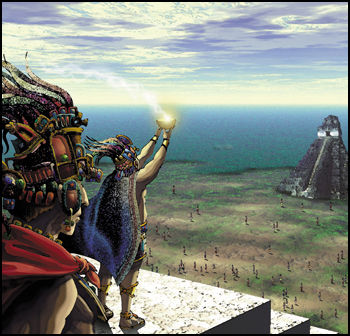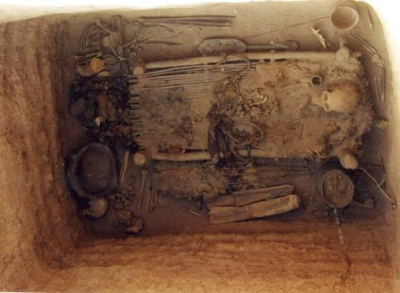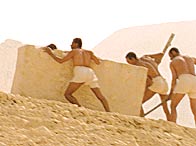
Agriculture led to inequality
 Last week, I pointed out how farming
actually made us less healthy
than our hunter-gatherer forefathers. Agriculture seemed to
make us less pleasant as well.
Last week, I pointed out how farming
actually made us less healthy
than our hunter-gatherer forefathers. Agriculture seemed to
make us less pleasant as well.
I started becoming
interested in early agriculture due to my obsession with Mayan pyramids and Native
American mounds.
As I read about the cultures that built these inspiring structures,
separated by thousands of miles and
years, their stories began to look eerily similar. Corn showed
up, kings sprang up, and the common guy got roped into building giant
edifices rather than paying attention to his own life. When the
same story (albeit with a different grain) was repeated in the Fertile
Crescent, I figured corn wasn't the culprit; agriculture was.
Evidence from modern
hunter-gatherer societies suggests that these
people have and had a  very egalitarian structure
with a focus on the
good of the tribe. Peopled lived in
communal villages where sharing with the group was the first priority,
and individual families and possessions weren't a big deal. There
was no such thing as richness and poverty. Instead, the whole
tribe ate, or the whole tribe went hungry.
very egalitarian structure
with a focus on the
good of the tribe. Peopled lived in
communal villages where sharing with the group was the first priority,
and individual families and possessions weren't a big deal. There
was no such thing as richness and poverty. Instead, the whole
tribe ate, or the whole tribe went hungry.
As soon as people began
farming (and had the ability to store a surplus), our entire social
structure
changed. The family became the the first obligation of the
individual, and certain families became much richer than others.
Rather than living in nearly identical houses, rich families built
large edifices while poor families lived in hovels. The rich were
buried with luxurious goods, while the poor were tossed alone into
their graves. Ironically, surplus food had created poverty.

This new notion --- rich
and poor --- quickly gave rise to totalitarian
governments. Elite leaders were able to convince or coerce their
followers into building the huge structures that still remain as
tourist attractions in Central America and Egypt. Fast forward
ahead to the present and we see that even modern democracies are ruled
by an elite few. In essence, the first farmers seem to have
harvested inequality along with their wheat.
This post is part of our History of Agriculture lunchtime series.
Read all of the entries:
|
Want more in-depth information? Browse through our books.
Or explore more posts by date or by subject.
About us: Anna Hess and Mark Hamilton spent over a decade living self-sufficiently in the mountains of Virginia before moving north to start over from scratch in the foothills of Ohio. They've experimented with permaculture, no-till gardening, trailersteading, home-based microbusinesses and much more, writing about their adventures in both blogs and books.
Want to be notified when new comments are posted on this page? Click on the RSS button after you add a comment to subscribe to the comment feed, or simply check the box beside "email replies to me" while writing your comment.

Don't overlook the role of organized religion in creating centralized and totalitarian governments. For as long as there have been kings, there have been priests as well. And the ranks of the royal and priestly elite have been thoroughly intermeshed in most societies.
Of course when you get down to it, organized religion is just a powerful means to control people; threatening people with devine retribution. Most kings claimed at least devine approval (e.g. the "mandate of heaven" in China, the "devine right of kings" in Europe) if not devine ancestors (e.g. Egyption pharaohs being incarnations of horus, Japanese emperors descent from the sun godess).
Also, even in neolithic times there were marked differences in status, as evidenced by burial gifts etc.
I didn't want to step on anyone's toes by getting into religion. I tend to agree with Jared Diamond's (and your) take that religion was an important tool to control the masses. He notes that although pre-agricultural people believed in the supernatural, they didn't have religions (not sure how he could say that, but he did seem to research his assertions.) He noted that religions sprang up right along with kings.
I tend to agree with Jared Diamond's (and your) take that religion was an important tool to control the masses. He notes that although pre-agricultural people believed in the supernatural, they didn't have religions (not sure how he could say that, but he did seem to research his assertions.) He noted that religions sprang up right along with kings.
On the other hand, I disagree with your last assertion that there were marked differences in status in Neolithic times as evidenced by burial gifts. Based on the three whole books I've read on the subject (I know, not much ), differences in stature as evidenced by different amount of burial goods definitely followed, not preceded, agriculture.
), differences in stature as evidenced by different amount of burial goods definitely followed, not preceded, agriculture.
Religion gets way more respect than it warrants, given the amount of death and suffering it has caused over the milennia.
Besides, the connection between royal and priestly elites is widely supported by evidence. How can it be disrespect to state that?
Given the amount of Venus figurines found all over Europe and spanning a period from 35,000 years ago to 11,000 years ago, there are widespread theories that they are part of a fertility or mother godess cult. Of course there is no way to prove that.
But the wide spread area and timespan of the founds suggests an important cultural force spanning many tribes and cultures. It could easily have been the longest-running religion in history!
We've got our own variety of the bible belt over here.
In the late 1970s a lot of those people refused to have themselves and their children vaccinated against poliomyelitis because of religious reasons. With the rather predictable result that a lot of them contracted the disease. All poliomyelitis outbreaks in the Netherlands after the deployment of the vaccine were in these ultrareligious communities.
If an adult wants to make that dicision, I'd still consider it pretty stupid, but I would consider that a persons right (with the exception for healthcare professionals, where I think such vaccination should be mandatory). But to withhold it from your children is something that I would label as mistreatment or even criminal negligence.
In no circumstance I consider such a decision worthy of respect, however.
Thank you, Anna, for being sensitive to the subject and for attempting to prevent the pedantic rants that inevitably ensue comments concerning religion (either pro or con).
Everyone has a right to his or her beliefs but at the end of the day what we have in common here is our passions for creating greater self sufficiency, protecting ecological integrity and forging relationships with those who share some of our goals and dreams in these areas. While our beliefs may or may not be wildly different, they do in some way underpin our formation of and action toward achieving these goals.
Thanks for sharing your research, your projects and your goals with us. I have great respect for what you do.
Despite my recent interest in Buddhism, I agree with both of you on religion. More harm than good has come out of the vast majority of religious beliefs. Of course, that's easy to say when I am somewhere between agnostic and atheist, with a hefty leaning to the latter.
I don't bother with too much tiptoeing either... even in the religious south.